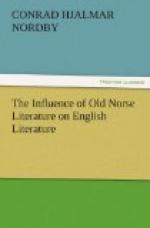(P. 119.)
In still another place has Morris departed far from the saga story. According to the poem, Sigurd meets each warning of Fafnir that the gold will be the curse of its possessor with the assurance that he will cast the gold abroad, and let none of it cling to his fingers. The saga, however, has this very frank confession: “Home would I ride and lose all that wealth, if I deemed that by the losing thereof I should never die; but every brave and true man will fain have his hand on wealth till that last day.” Here, again, we see an adaptation of the story of the poem to modern conceptions of nobility. It remains to be said that the ernes move Sigurd to take the gold for the gladdening of the world, and they assure him that a son of the Volsung had nought to fear from the Curse. The seven-times-repeated “Bind the red rings, O Sigurd,” is an admirable poem, but it does not contain information concerning Brynhild, as do the strophes of Reginsmal which are the model for this lay.
Let us look at the art of Morris as it is shown in telling “How Sigurd awoke Brynhild upon Hindfell.” As in the saga, so in the English poem, this incident has a setting most favorable to the display of its remarkable beauties. It is a picture as pure and sweet as it has ever entered into the mind of man to conceive. The conception belongs to the poetic lore of many nations, and children are early introduced to the story of “Sleeping Beauty.” There are some features of the Old Norse version that are especially charming, and first among them is the address of the awakened Brynhild to the sun and the earth. We are told that this maiden loved the radiant hero that here awoke her from her age-long sleep, but not for him is her first greeting. A finer thrill moves her than love for a man, and in Morris’s poem, this feeling finds singularly beautiful expression:
All hail O Day and thy Sons, and
thy kin of the coloured things!
Hail, following Night, and thy Daughter that leadeth
thy wavering
wings!
Look down with unangry eyes on us today alive,
And give us the hearts victorious, and the gain
for which we strive!
All hail, ye Lords of God-home, and ye Queens
of the House of Gold!
Hail thou dear Earth that bearest, and thou Wealth
of field and fold!
Give us, your noble children, the glory of wisdom
and speech,
And the hearts and the hands of healing, and the
mouths and hands that
teach!
(P. 140.)
In order to see just what the art of Morris has done for this poem, let us compare this address with the rendering of the Sigrdrifumal, which tell the same story and which Morris and Magnusson have incorporated into their translation of the Voelsunga Saga. The verses are not in the original saga:
Hail to the day come back!
Hail, sons of the daylight!
Hail to thee, dark night, and thy daughter!
Look with kind eyes a-down,
On us sitting here lonely,
And give unto us the gain that we long for.
Hail to the AEsir,
And the sweet Asyniur!
Hail to the fair earth fulfilled of plenty!
Fair words, wise hearts,
Would we win from you,
And healing hands while life we hold.




